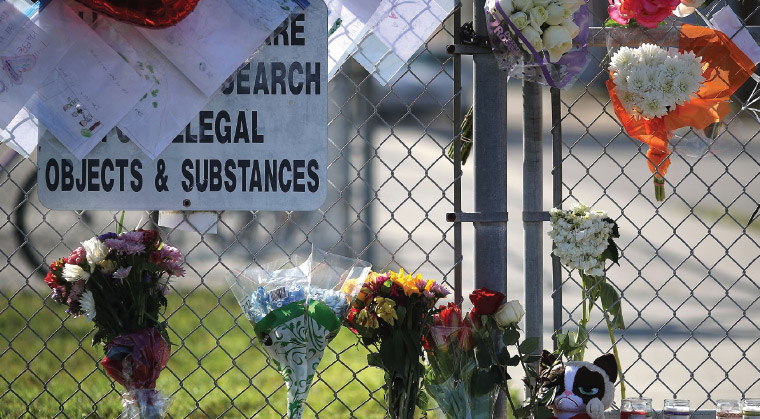A Community in Shock

As Florida shooting strews heartbreak and horror, gun control remains a distant dream

I
t was a heartbreaking sight. Thousands of people, holding candles, gathered for a vigil in Parkland, Florida, to pay their last respects to 17 students murdered at Stoneman Douglas High School. Among them were five Jewish souls — one teacher and four students. Clerics and rabbanim came to the vigil.
Rabbi Mendy Gutnick of Chabad Parkland was there. He told me in a telephone interview that Parkland, not far from Boca Raton, has a large and active Jewish community.
“People are having a really difficult time,” Rabbi Gutnick said. “There is a sense that ‘it’s impossible that this thing happened to us.’ It’s a trauma for the entire school. There is no one who was not affected.”
I asked the rabbi what the Jewish community thinks about gun control legislation. “I was the opening speaker at the vigil,” he said. “We really didn’t want it to become political. We said that this is for the victims, but all of a sudden it started to get political.”
Rabbi Gutnick was referring to Broward County Sheriff Scott Israel and others at the vigil who vowed to work toward tighter gun control laws. “The truth of the matter is that it is agreed pretty much among everybody in the city, including ourselves, that there is no benefit for anyone having assault weapons that can cause this kind of carnage. But we will leave [that issue] for the professional advocates.”
Parkland resident Limor Golan described to Mishpacha how her daughter, a tenth-grader at Stoneman Douglas, phoned her in terror during the shooting on February 14. “She said, ‘They’re shooting at us! There’s shooting and I’m running away!’ ” Golan said her daughter ran home, then started to text her friends, who were hiding under desks. “She was very distraught and traumatized,” Golan said.
Golan added that her daughter knew the shooter and had always said that he was “weird.” When the names of the three victims were released, her daughter had a panic attack. “She said that now she understands the kids in Israel who have to run to bomb shelters. We’re all in shock. No one believed such a thing could happen in Parkland.”
The Parkland tragedy turned the national spotlight once again on gun control. Since the Columbine High School massacre in 1999, there have been shootings at 170 primary or secondary schools, according to an ongoing Washington Post analysis. According to the Gun Violence Archive, there have been 6,728 shooting incidents across the country since the beginning of the year, in which some 1,800 people have been killed and another 3,200 injured. This figure includes all gun-related deaths, including accidental shootings, murders, and suicides.
So far in 2018, 30 people have been killed in mass shootings, defined as incidents with at least four victims. Data from previous years indicates that the picture is not encouraging: In 2017, mass shootings claimed the lives of 437 people, and in 2016, 432 people.
The last five months alone have seen three of the eight most serious mass shootings in US history: the October 2017 massacre at the Mandalay Bay Hotel in Las Vegas, which claimed the lives of 59 people; the shooting in November at the Sutherland Springs church in Texas, where 25 people were murdered; and now the shooting spree at Stoneman Douglas.
But as the number of dead increases, the debate over gun control only grows sharper. Americans are almost equally divided on the issue, and neither side seems capable of hearing the other. Meanwhile, in Congress, a bill introduced after the Las Vegas massacre remains stalled. Until the next tragedy reopens the debate.
(Excerpted from Mishpacha, Issue 699)
Oops! We could not locate your form.







